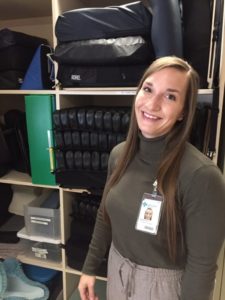
The most common question Noelannah Neubauer gets when talking to non-medical professionals is, “What does an Occupational Therapist do exactly?”
Neubauer describes her job the following way:
“I do anything I can to help people get their independence back. Whether that is to get back to their work, their hobbies, or just helping people get back to their regular lives,” said the occupational therapist from Lacombe, a city located 30 km north of Red Deer.
According to the Alberta College of Occupational Therapists, an occupational therapist is trained in both physical and mental health therapies. They work with patients who have physical injuries, disabilities, as well as psychological challenges. Occupational therapists promote self-management skills and strategies for self-care and assist patients to get back to the “job of living.”
Occupational therapists can work in a wide variety of settings, including home care, schools, mental health facilities, or, like Neubauer, hospitals and long-term care facilities.
Noelannah’s background is as broad ranging as her portfolio. After completing high school in Edmonton, she attended the University of British Columbia, Okanagan Campus, where she did her undergraduate degree in Human Kinetics. She then went on to pursue a master’s degree in Science in the Healthy Exercise and Aging Lab, where she discovered a passion for utilizing functional tasks and muscle activity for early detection of frailty among seniors.
Neubauer carried this passion into a PhD in Rehabilitation Science program at the University of Alberta, where she focused on the utilization of assistive technologies for persons living with dementia. Her cumulative thesis project focused on developing a framework and guideline to mitigate the risks associated with persons living with dementia who wander and go missing in community and facility settings.
After completing the PhD program, Neubauer went on to pursue her master’s degree in Occupational Therapy at the University of Alberta. During the course of the OT program, she had the opportunity to complete a seven-week placement in the region of east-central Alberta known as the “3Cs,” Consort, Castor, and Coronation.
It was there that she got her first taste of rural life–to which she took an immediate liking.
“I feel like there are many younger health-care workers who don’t really know what working in a rural setting is like. They might see a job posting, but they don’t understand how welcoming these communities can be, or how exciting and challenging the roles can be.”
— Noelannah Neubauer, Occupational Therapist with Alberta Health Services
“The great thing about working in a rural health-care setting is you will never have the same day twice. I did a previous OT placement at a large facility in Edmonton, and I felt it got very repetitive.”
“In rural Alberta, there is such a wide scope of practice, and you have such a tight-knit group of coworkers that you can never be bored.” she explained.
As the pandemic subsided, Neubauer was hired to work as a full-time occupational therapist at Lacombe Hospital and Care Centre and Bentley Care Centre. Here she finds that she gets the connection with patients she missed while being a researcher, while still receiving mentorship from veterans in the rural health-care field.
“I have been fortunate to work with great leaders like [RhPAP Board member] Elaine Finseth, who is such a great supporter of allied health workers in central Alberta. She has really helped me to find a long-term path, and to set out some career goals that I can work toward in the future.”
Neubauer is happy to be a full-time occupational therapist. She loves the challenges that working in a smaller setting offers, and the rapport she is able to build with local seniors who are working to regain their independence.
As for long-term goals, she would like to play a major role in evaluating how we care for people with dementia–a huge challenge as Alberta and Canada deal with aging populations.
She would also like to be an advocate for rural health-care recruitment and retention.
“I feel like there are many younger health-care workers who don’t really know what working in a rural setting is like. They might see a job posting, but they don’t understand how welcoming these communities can be, or how exciting and challenging the roles can be.”
Overall, she is thrilled to be using her wide set of skills in patient care, and helping people regain their independence within the community they call home.
— Tyler Harke
